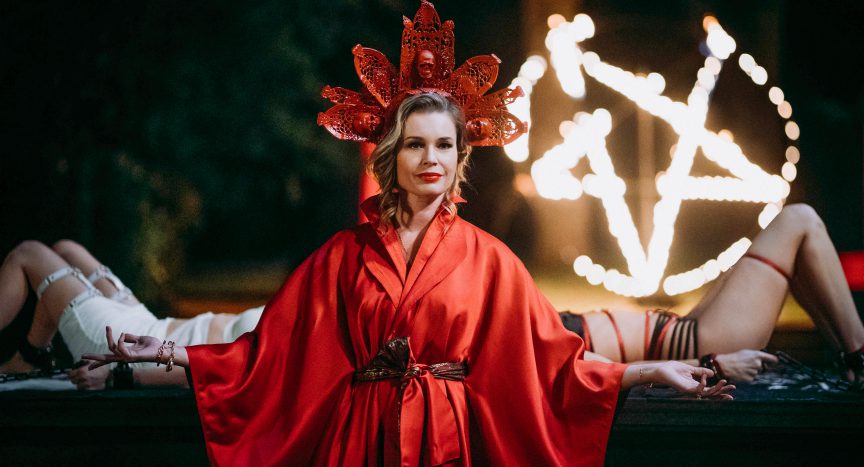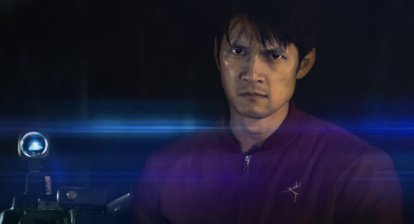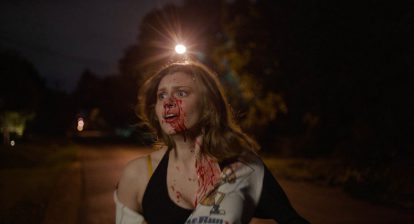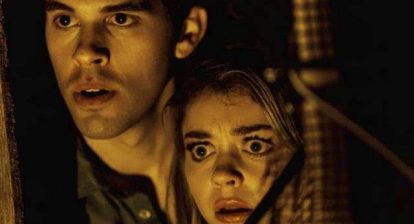Grady Hendrix is one of horror’s up-and-comping writers. He has ten books under his belt including at least three excellent novels—Horrorstör, My Best Friend’s Exorcism, and We Sold Our Souls—and the amazing horror novel history Paperbacks from Hell. In 2002 he founded the New York Asian Film Festival. In 2017 he co-wrote the screenplay for Mohawk with Ted Geoghegan. Frankly, it would be shorter to list the things he hasn’t done.
Most recently, we caught up with Hendrix to talk about his newest film Satanic Panic, which hits theaters and VOD on September 6th.

Wicked Horror: Do you ever have moments where you freak out that say, Jerry O’Connell is going to be in my movie?
Grady Hendrix: That was very cool, though as the writer, you’re sort of the last person to know and the lowest person on the Totem pole. By the time it gets to you, no one else is excited about it. They’re like, “Oh yeah, Jerry O’Connell. We’ve got to deal with his hotel room now.” You’re like, “What? Jerry O’Connell!? No one else is excited?” They were excited three or four days ago when they found out about it. It’s weirder for me to see any actor saying things that I wrote.
The thing that freaked me out in this movie was watching the effects get built. The guy who did them did such an amazing job. It’s like, that tree monster, is an astounding piece of costume/props/effects. It’s just a paragraph that I wrote and he built this astonishing thing. That, more than any actors or celebrities. The effects, I was just like, “Holy cow. This is a horrible horrible, really awful, psychologically damaged thing that came out of my head.”
There’s a lot of monsters in this that ooze, and suck, and goop, and I probably have some issues in there with sex and genitals or something. To see those built by someone and actually working, that’s what made my head sort of spin.

Related: Director Chelsea Stardust Talks Satanic Panic [Interview]
WH: What are you most excited for audiences to see in Satanic Panic?
GH: It’s very hard for me, because I hate seeing movies I’ve done. It’s really beneficial, but Ted Geoghegan, who I did Mohawk with, had to put a gun to my head to watch it in a theater. I was like, “It’s going to be embarrassing,” but he was like “You’ve got to watch this.”
I felt the same way about Satanic Panic but it’s so educational for me to see something I’ve written with actors saying the words and seeing how it works, and what an audience responds to. With Satanic Panic, I saw at the Overlook Film Festival down in New Orleans and audiences respond to things so radically different than I would’ve imagined. I’d seen a rough cut, and some of the stuff in the rough cut that I was like, “Oh, no. I don’t know how I feel about that,” were things that the audience loved. So it was really super educational for me. That said, I never want to do it again.
I hope an audience goes. I hope they have fun. But once I’m done with a book or a movie, I just want people not to be mean to it and not to throw any rocks. That’s the sort of detail that my wishes get.
WH: So you have more of an anxious reaction than an excited one.
GH: Yeah. I mean, I hope people like it. I really try to keep moving forward onto the next project. All I see with stuff I’ve worked on are the shortcomings. I try not to dwell on them.
Related: Satanic Panic [Frightfest 2019 Review]
WH: Okay. That mentality helps make sense of the ten books and two films you’ve written. With that much success, did you ever have a moment where you realized “I made it,” or are you feel like you’re still waiting for it?
GH: I’m still waiting for that moment. I couldn’t feel less like I’ve made it. It’s funny. I’ve wanted to make my living doing creative stuff for a long time, for as long as I can remember. I certainly feel like I have a toe in the door than I did before, but no. I still feel like at any moment someone is going to be like, “What are you doing? Go to law school. Get a real job, you twerp.”
So no, I don’t feel relaxed, at all. I’ve actually got a book coming out in spring of next year, The Southern Book Club’s Guide to Slaying Vampires and I just finished doing the page proofs on that last Thursday. On Friday, I started revising the manuscript for the next book, which is something I’ve written a rough draft of earlier and I need to do a couple of revisions on it before it can go out, but I just have to keep moving. It’s really dysfunctional on a lot of levels.
WH: Like a shark. You can’t stop swimming.
GH: That’s a very romantic and flattering way to put it, “Like a shark.” You could also say, “Like a compulsive-neurotic who has impostor syndrome.”
WH: Speaking of jobs, you capture the feeling of minimum wage jobs really well in Satanic Panic and the culture of retail in Horrorstör. How do you get those details so right?
GH: Thanks! There’s two things. One is that I’ve had lots of crappy jobs. I think everyone has. There were points in my life where all I had was crappy jobs. I think everyone, unless you’re a very privileged person, has been in Sam’s position, where you’re like, “Crap. I’ve got x amount of dollars. Do I put gas in my car? Do I buy dinner? Do I have to make a deposit?” We all have to make those crummy choices at some points, financially.
The second thing is that it’s something I don’t see that often in books and movies, and I feel like jobs, and especially crappy jobs, are the great equalizer. Most of us have had them. And I feel like it’s a really easy way to connect an audience with a character. We’ve all been there. We spend most of our lives at our jobs, around people we may or may not particularly like, doing work we may or may not find particularly meaningful. Showing someone what a character does for a living is a really easy way to either hate them or feel empathy with them or think “Oh God, they’re really bad at that.” Or “they’re quite good at that.”
One of the things I love seeing in movies is work on screen. That’s what I love Michael Mann movies, where they show the details of how things happen. People really like seeing jobs. It’s why Undercover Boss was a hit show for a while. People love reality shows like Kitchen Nightmare, Bar Rescue, or whatever. You see workplaces. We’re all fascinated by it.
WH: Did you have one particularly crappy job?
GH: Aw man. I had so many. I worked in a bookstore in high school, which was actually not a bad job. I always had a fear that when I checked a book out of the library or bought a book, that people would judge me for what I was reading. There were years in high school where I would not buy science fiction books or fantasy books because I was like, “They’re going to judge me.” Then my mom told me, “You’re so vain. No one cares what you buy. These people are professionals.” Then I worked in a bookstore and realized that all we do is judge what people buy. That hurt. That hurt a lot. That ruined some illusions I had.
But no. I had tons of crappy jobs. I temped for a long time. I sold cleaning chemicals. I’ve done environmental audits for hotels, which sounds fancy, but what it means is that you crawl around in their wet garbage in the middle of the night when no one’s working. I’ve sold semi-precious gem stones over the phone. I worked for a billboard company that needed their files relabeled. It was the ‘90s and I spent almost three months putting stickers on stacks. I saw file folders that had five digits on them and then recorded them in three different places to make sure they were all consistent across their directories of files. I’ve answered phones. I’ve done all kinds of junk.
Jobs are, literally, the one thing so horrible that you have to get paid money to do it. Jobs just suck. Period. Full stop. If someone has a job they find satisfying, good. I am so happy for them. Jobs are tough for me.
My wife is a chef and she opened a restaurant, so we’re really connected with the service industry. I’ve had to wait tables in an emergency when we had a no-show, and it’s just not a skill-set I have. It’s a job that doesn’t look easy, and apparently I turn it into a disaster. I have a lot of respect for people who do it, but man, it’s always harder than you think it is.
WH: To swing back to the bookstore, did your time their influence Paperbacks from Hell? Did you get any of those paperbacks while you were there?
GH: No. It was a bookstore that sold new books. And even though I really spent a lot of time in middle school and high school in used bookstores—because, you know, more books for your buck, you can make your money go further—I didn’t read horror, because I felt the covers were too gross. They really freaked me out.
I was big on sci-fi and fantasy, and military fiction, men’s adventure stuff. Dudes with crossbows on the cover, riding motorcycles and fighting communists in post-apocalyptic America.
WH: When did you take the leap into horror?
GH: You know, I don’t know. I read Stephen King and Clive Barker in high school. Everyone did. I was always a big fan of horror movies. It was just a worldview thing. At some point, it seemed to be inevitable slide. No matter how much I grabbed the side of the slope I kept sliding down and wound up in horror.
It’s funny. I write books and movies about what I see in the world. I think they’re really realistic. But apparently they’re horror. Go figure.
WH: You must’ve read a lot for Paperbacks from Hell and watch a lot of movies to run the New York Asian Film Festival. How do you strike a balance between consuming media and creating it?
GH: You have to make choices at a certain point. Writing’s my job. I do eight- to ten-hours a day everyday. I have an office. I sit in there. I work. Also, when I say “work,” realize that part of that is f***ing around on the internet, which is an inevitable side-product of work. I fight that as much as I can.
In terms of consuming media, I don’t watch a lot of TV. And I don’t say that with any pride. When people are like “Oh, are you watching this? Are you watching that? This is so good” I kind of feel like a jerk. I don’t want to be that person who’s like “*I* don’t watch TV.” But I just don’t have time. You know, there’s so much stuff I have to read for work, and to keep up with research for projects.
I watch movies, but way fewer than I think. Like, I just saw Booksmart which is the first new movies I’ve seen in about a year other than the Avengers movie. I have to make choices, and it usually winds up with reading, and that’s usually reading related to work.
It’s nothing I’m proud of. It makes me feel a little dysfunctional.
WH: Did you like Booksmart? I thought it was funny.
GH: You know, I did. I thought it was funny too. I had a weird thing where I actually know someone whose house was used as a location in it and I didn’t know that when I saw the movie. That so blew me away, I felt like such a hillbilly seeing tall buildings for the first time. It threw me out of the movie. I liked it, I thought it was funny.
It’s also, with movies like Booksmart, I’m always like, “I would love if this movie took a turn.” Like, if they get in an Uber and wind up shackled to the wall in someone’s basement, being prepped to be shipped overseas as part of an international human sacrifice ring. I just love tonal switches like that. I liked Booksmart a lot, but I wish it could’ve involved more human trafficking and torture basements.
WH: It had a moment in there too with the Uber driver, that it almost felt it was going to do it.
GH: The serial killer Uber driver. I know!
WH: We’re almost out of time. Is there’s any question you’d wished I had asked you?
GH: One of the things that I think is so funny about Satanic Panic is that it was shot down in Dallas in actual rich people’s homes. It looks like anywhere. It’s something that really blows my mind: how much America looks alike when you get to a certain socioeconomic level. It all starts to look copy and pasted from other McMansions, from other subdivisons, and other gated communities. There’s this weird flattening effect that wealth has.
I almost yearn for tacky rich people again. I feel like the new ones all have sort of neutral taste. I yearn for some Robin Leach Lifestyles of the Rich and Famous, 80s tackiness again.
WH: So you want to bring the tackiness back to the uber rich.
GH: The tackiness, or just the over-the-top bad taste. I feel like really rich people try really hard to be tasteful now, and it’s just making them boring. Go human hunting on your private reserve. Get two helicopters and crash them together. Blow up a model of the Statue of Liberty that’s six-hundred feet tall and made of cake for your daughter’s Sweet Sixteen birthday party. Go over-the-top guys. You’ve got the money. Stop acting like you’re normal!





